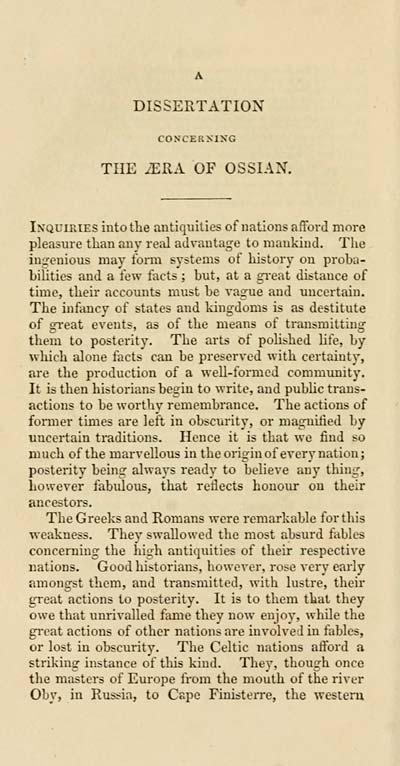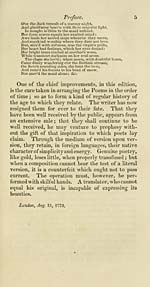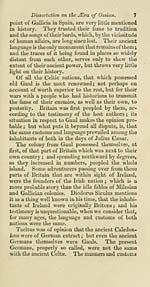Ossian Collection > Poems of Ossian
(14)
Download files
Complete book:
Individual page:
Thumbnail gallery: Grid view | List view

DISSERTATION
COSCEilNIXG
THE yERA OF OS SI AN.
Inquiries into the antiquities of nations afford more
pleasure tlian any real advantage to mankind. The
inncenious may form systems of history on proba-
bilities and a few facts ; but, at a great distance of
time, their accounts must be vague and uncertain.
The infancy of states and kingdoms is as destitute
of great events, as of the means of transmitting
them to posterity. The arts of polished life, by
which alone facts can be preserved with certainty,
are the production of a well-formed commimity.
It is then historians begin to write, and pubUc trans-
actions to be worthy remembrance. The actions of
former times are left in obscurity, or magnified by
uncertain traditions. Hence it is that we find so
much of the marvellous in the origin of every nation;
posterity being always ready to believe any thing,
however fabulous, that reflects honour on their
ancestors.
The Greeks and Romans were remarkable for this
Aveakness. They swallowed the most absurd fables
concerning the high antiquities of their respective
nations. Good historians, however, rose very early
amongst them, and transmitted, with lustre, their
great actions to posterity. It is to them that they
owe that unrivalled fame they now enjoy, while the
great actions of other nations are involved in fables,
or lost in obscurity. The Celtic nations afford a
striking instance of tliis kind. Thev, though once
the masters of Europe from the mouth of the river
Oby, in Russia, to Cape FinisteiTC, the western
COSCEilNIXG
THE yERA OF OS SI AN.
Inquiries into the antiquities of nations afford more
pleasure tlian any real advantage to mankind. The
inncenious may form systems of history on proba-
bilities and a few facts ; but, at a great distance of
time, their accounts must be vague and uncertain.
The infancy of states and kingdoms is as destitute
of great events, as of the means of transmitting
them to posterity. The arts of polished life, by
which alone facts can be preserved with certainty,
are the production of a well-formed commimity.
It is then historians begin to write, and pubUc trans-
actions to be worthy remembrance. The actions of
former times are left in obscurity, or magnified by
uncertain traditions. Hence it is that we find so
much of the marvellous in the origin of every nation;
posterity being always ready to believe any thing,
however fabulous, that reflects honour on their
ancestors.
The Greeks and Romans were remarkable for this
Aveakness. They swallowed the most absurd fables
concerning the high antiquities of their respective
nations. Good historians, however, rose very early
amongst them, and transmitted, with lustre, their
great actions to posterity. It is to them that they
owe that unrivalled fame they now enjoy, while the
great actions of other nations are involved in fables,
or lost in obscurity. The Celtic nations afford a
striking instance of tliis kind. Thev, though once
the masters of Europe from the mouth of the river
Oby, in Russia, to Cape FinisteiTC, the western
Set display mode to: Large image | Transcription
Images and transcriptions on this page, including medium image downloads, may be used under the Creative Commons Attribution 4.0 International Licence unless otherwise stated. ![]()
| Early Gaelic Book Collections > Ossian Collection > Poems of Ossian > (14) |
|---|
| Permanent URL | https://digital.nls.uk/77740897 |
|---|
| Description | Selected books from the Ossian Collection of 327 volumes, originally assembled by J. Norman Methven of Perth. Different editions and translations of James MacPherson's epic poem 'Ossian', some with a map of the 'Kingdom of Connor'. Also secondary material relating to Ossianic poetry and the Ossian controversy. |
|---|
| Description | Selected items from five 'Special and Named Printed Collections'. Includes books in Gaelic and other Celtic languages, works about the Gaels, their languages, literature, culture and history. |
|---|

